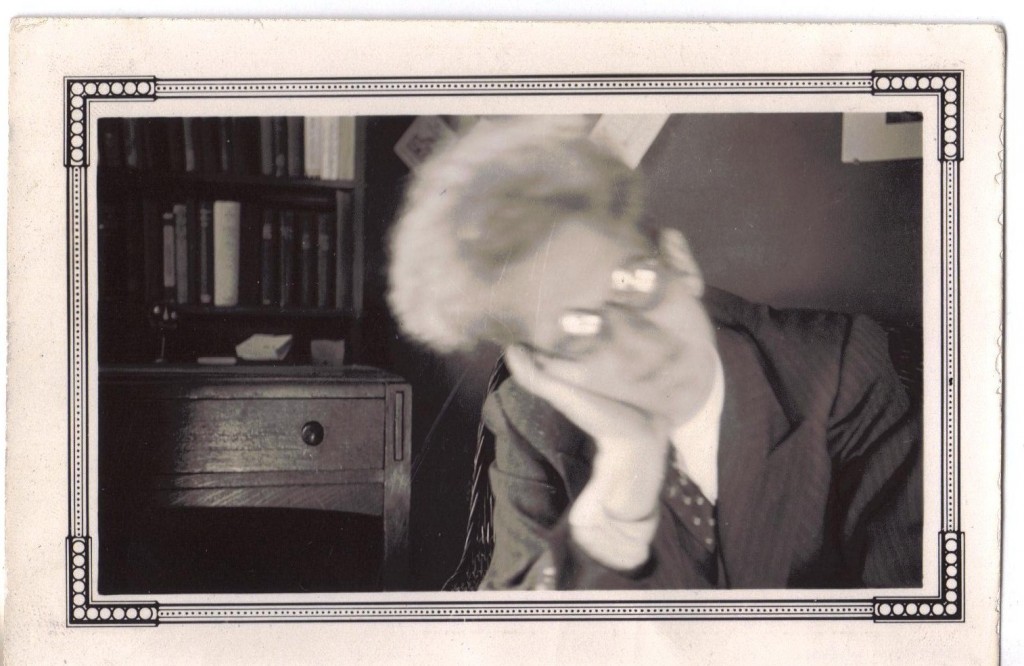Frye as a 17 year old freshman at Victoria College, 1929-1930
Daily Archives: December 31, 2010
TGIF: Onion News Network
httpv://www.youtube.com/watch?v=gnZOCrxzWyU
One of the first things to look forward to in the new year: the Onion News Network.
More Frye on Becket
Becket’s shrine
Further to the earlier post on Thomas Becket, here’s Frye writing to Helen Kemp from London, 30 December 1936
On Boxing Day Elizabeth [Fraser] came down—she was getting a bit fed up in Oxford—and we went out to dinner and went to see Murder in the Cathedral but Elizabeth got sick, almost fainted and had to be brought home in a taxi and sent to bed with a hot water bottle. Sunday she was all right, but we didn’t do much except go to Soho for dinner, which I didn’t like much. . . . .Well, anyway, Tuesday we went to see Murder in the Cathedral again. It’s a wonderful play all right—read it sometime. It will probably come to Toronto anyway. The chorus of women was full of the loveliest poetry, and as a play it came off very well. I had reserved tickets for this performance, but through a very fortunate error (at least I assume it was an error) we got seats in the front row of the dress circle, where we were practically breathing down the actor’s necks. The female functionary who had fluttered around Elizabeth Saturday evening and offered her peppermint lozenges came up in the intermission and said “Are you feeling better now, dear?” Elizabeth left early to get the last train back to Oxford, which leaves at eleven and is called the “Fornicator” by the Oxford students.
Union of Soviet Socialist Republics
httpv://www.youtube.com/watch?v=fFSTcRyeB_Q
Mikhail Gorbachev resigns as president and announces the dissolution of the U.S.S.R
On this date in 1991 the U.S.S.R. was officially dissolved, having lasted 69 years and one day.
Frye in The Double Vision:
History moves in a cyclical rhythm which never forms a complete closed cycle. A new movement begins, works itself out to exhaustion, and something of the original state then reappears, though in a quite new context presenting new conditions. I have lived through at least one major historical cycle of this kind: its main outlines are familiar to you, but the inferences I have drawn from it may be less so. When I arrived at Victoria College as a freshman in September 1929, North America was not only prosperous but in a nearly hysterical state of self-congratulation. It was widely predicted that the end of poverty and the levelling out of social inequalities were practically within reach. In the Soviet Union, on the other hand, the reports were mainly of misery and despair. The inference of general public opinion on this side of the Atlantic was clear: capitalism worked and Marxism didn’t.
Next month came the stock market crash, and there was no more talk of a capitalist Utopia. By the mid-1930s the climate of opinion had totally reversed, at least in the student circles I was attached to. Then it was generally accepted dogma that capitalism had had its day and was certain to evolve very soon, with or without a revolution, into socialism, socialism being assumed to be both a more efficient and a morally superior system. The persistence of this view helped to consolidate my own growing feeling that myths are the functional units of human society, even when they are absurd myths. The myth in this case was the ancient George and dragon one: Fascism was the dragon, democracy was the maiden to be rescued, and despite the massacres, the deliberately planned famines, the mass uprooting of peoples, the grabbing of neighbouring territories, and the concentration camps, Stalin simply had to fit into the role of rescuing knight. This was by no means a unanimous feeling — among Communists themselves there was a bitterly anti-Stalin Trotskyite group — but it extended over a good part of the left of centre.
That cycle has completed itself, and once again people in the West are saying, as they said sixty years ago, that it has been proved that capitalism works and that Marxism does not. With the decline of belief in Marxism, apart from an intellectual minority in the West that doesn’t have to live with it, the original Marxist vision is often annexed by the opposite camp. Going back to the competitive economy that Marx denounced, we are often told, will mean a new life for the human race, perhaps even the ultimate goal that Marx himself promised: an end to exploitation and class struggle. Hope springs eternal: unfortunately it usually springs prematurely. (CW 4, 167-8)

